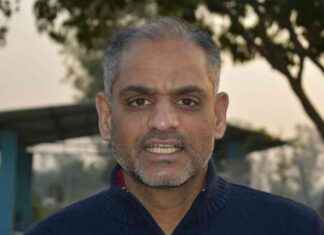Since Corona and because of the Ukraine war, pessimism and concerns have long prevailed in the German economy. At the top meeting with Chancellor Olaf Scholz, he was visibly and audibly trying to do the opposite – in line with his new motto “Confidence”.
“We have every reason to be more optimistic about the future than we were a year ago when it comes to our own country,” said the SPD chancellor. It was possible to make Germany independent of Russian energy imports in a very short time and to prevent an energy and economic crisis. We are also prepared for the coming winter, he emphasized and thanked everyone who had saved energy over the past few weeks and months.
And the Chancellor’s optimism goes even further: “First of all, I assume that Germany is about to enter a phase of great growth,” he said. He justified his optimism with the German goal of becoming climate neutral by 2045. The implementation of the climate protection law requires “hundreds of billions in private sector investments” to an extent “that we have not been used to for many decades”. As examples, he named new production processes, insulation and the construction of new houses or the infrastructure.
Economy with constant worries
The German economy, on the other hand, is in constant worry mode: The complaints that representatives of the four major business associations BDI, BDA, DIHK and ZDH brought up at the Scholz top-level talks in Munich range from war, energy prices and bureaucracy to the shortage of skilled workers. Although the presidents of the trade associations of the traffic light government gave a rather positive testimony to their crisis policy, their description of the situation sounded much more negative.
A large number of handicaps currently have to be dealt with, said the President of the Federation of German Industries (BDI), Siegfried Russwurm, even before the annual top-level talks. Despite the current crises, Germany needs a long-term strategy again in order to remain successful worldwide.
“Energy costs are still high. But we also have to contend with an obsession with regulation, which means that we often write more paper than we can really get to the front,” emphasized Russwurm. At the same time, Germany has the highest taxes in a global comparison, which makes the global competitiveness of industry “quite difficult”. High inflation is also “hurting”. In the future, a “long-line strategy” is needed and Germany “still has a lot of catching up to do” here.
Catalog of demands for the chancellor
DIHK President Peter Adrian explained: “We were able to overcome this energy crisis without a gas shortage, which saved us from a major crash.” The federal government’s crisis policy worked, but everything must continue to be done to ensure the international competitiveness of the German economy. At the same time, ways must be sought to decarbonize the economy and eliminate the shortage of skilled workers.
In a joint position paper, the associations describe their situation even more drastically: “The loss of industrial added value is no longer a theoretical danger. It’s already happening.” They call for a tax reduction for corporations to 25 percent, the acceleration of planning and approval processes, more flexible working time models including maximum weekly working hours, more modern rest time regulations and faster immigration of skilled workers.
Scholz also explicitly addressed the shortage of skilled workers. Among other things, one must ensure that women’s employment is increased through good childcare and that working life remains attractive for as long as possible. In addition, there will be a need for skilled labor immigration. “We will accelerate that considerably this year.”
Despite the pessimistic statements that have been made for years: At least among the large German corporations, some have come through the crises well so far. Many reported high profits, some at record levels. Although the number of insolvencies across the economy had recently risen over the year, they were still below the long-term values. Experts have not yet seen any signs of a wave of bankruptcies.












